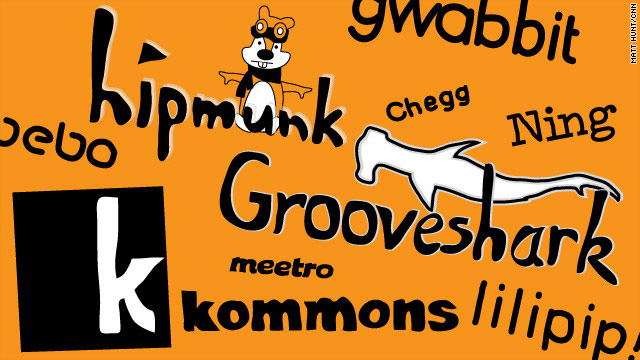Are all the good tech-company names taken?

- Simple or descriptive company names are less common in today's internet world
- With fewer domain names remaining, it makes it difficult for companies to choose monikers
- Made-up names allow a company to come up with its own definition of the word
(CNN) -- Bebo, Etsy and Kijiji sound more like baby's first words than the names of tech companies.
But tech companies they are -- a social-networking site, an online crafts store and another name for eBay classified ads, respectively. They're also examples of how simpler, more descriptive names are harder for tech startups to come by these days, says Brannon Cashion, president of brand consulting firm Addison Whitney.
"For a company to find a name that is a common word is very, very challenging in today's environment," Cashion says. "No one is naming a company Apple anymore. Those days are really long gone."
Cashion cites decreasing availability of domain names as the main reason, which can make naming a new company challenging in today's internet age. With more than 193 million domain names registered on the Web and hundreds of thousands more being bought each month, have all the good tech names been taken?
Well, that depends on how you evaluate a "good" name.
"Does the name elicit a reaction? Does it communicate something?" asks Nina Beckhardt, president and creative director of The Naming Group. "I look at the name as a communication platform where it tells people what you do, or in the case of tech companies, sparks interest."
Household names such as Google, Digg, Twitter, Skype and Yahoo certainly fit into the reaction names category, or as Beckhardt calls them, silly names.
"Google is arguably the main driver behind the 'silly name' trend that we're talking about," Beckhardt says. Derived from the word "googol," the name means the number one followed by 100 zeroes. To Google's founders, it symbolized their mission to organize the infinite amount of information on the web.
Now, what was once an uncommon word has become a verb and an expression that's used every day. "You don't search, you Google," Cashion says.
The same goes for Twitter. The name was chosen because "twittering is the sound birds make when they communicate with each other," according to Twitter 101 for Business, a guide released by the website in 2009. Sharing things with friends is a thing of the past. Now, you tweet them.
Similarly, a successful company can transform the meaning of a name that could have seemed controversial at first.
"Back in the '90s, it was Yahoo ... [as in] 'That yahoo over there.' When you Digg on somebody, it's slang for talking about somebody," Cashion says. "There are always downsides to names, but the most important thing is how companies use them as brands."
Since Google became successful, Cashion says he's seen a lot of companies taking on more fanciful names. For tech companies, this is born out of the nature of the industry.
"The more descriptive your name is, the more it speaks about your story today and not necessarily your story tomorrow," he says. "No business starts to only be a one-trick pony."
Cashion believes that fanciful words or playfully combined phrases not only allow for an available domain, they also give the company the power to define the word themselves.
Cody Brown, founder of Kommons, a social news platform, said his company's broad name gave the business room to grow.
"We preferred Kommons because it's more general and will help us later in the evolution of the company," Brown says. "It was a trade-off [between] being more specific and giving somebody a solid first impression, or being broad and opening our capabilities later on."
Commons was already taken, but by switching the "C" with a "K," Brown was able to secure a domain name.
Another naming trend has been tech companies that add, subtract or change a letter in a dictionary-defined word; Flickr, Tumblr, Vimeo, Kommons and Hipmunk, for example.
"The reason you get these startups with these insane names is because it's the [only] domains that are available," Brown says.
The first thing many new companies do is make sure they can register the domain name they want, said Adam Goldstein, founder of Hipmunk, a flight-search website.
"We were getting pretty antsy trying to get a good domain name, or frankly, a domain at all."
Goldstein's girlfriend suggested he look at small, furry animals for a company name because they would facilitate a good logo.
"I went for a dozen before I started leaving off the first or last letter," Goldstein said. "Hipmunk.com was in the middle of an auction when we were looking. I placed the minimum bid."
Though Hipmunk doesn't necessarily scream flight pricing, Goldstein says it's memorable and has so far been well-received. The logo, a chipmunk in pilot garb, is pretty cute, too.
Beckhardt adds that technology can often feel untouchable or unfriendly, but a creative name or logo makes the company feel more approachable.
Grooveshark, the name of a music-streaming service, was chosen over hundreds of other possibilities, said Ben Westermann-Clark, VP of public relations. One tech cliche is to codename a product by a combining a color with an animal, he says, which is what founders did at first -- Blue Shark.
Once closer to the launch, the founders looked at "anything under the sun," Westermann-Clark says. "After two days of being completely confounded and flustered, we were just like, 'Let's keep shark, because it's the coolest animal on the planet.'"
Combined with Groove, the name stuck.
"There isn't a limit to people's creativity," Westermann-Clark says. "But if you can come up with the perfect .com and it's actually available, then more power to you."
